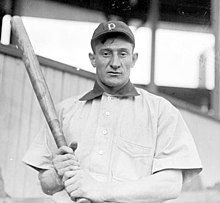Honus Wagner
| Honus Wagner | |||
|---|---|---|---|
 Wagner with the Pirates in 1903 | |||
| Shortstop | |||
| Born: February 24, 1874 Chartiers, Pennsylvania (now part of Carnegie, Pennsylvania) | |||
| Died: December 6, 1955 (aged 81) Carnegie, Pennsylvania | |||
| |||
| debut | |||
| July 19, 1897, for the Louisville Colonels | |||
| Last appearance | |||
| September 17, 1917, for the Pittsburgh Pirates | |||
| Career statistics | |||
| Batting average | .327 | ||
| Hits | 3,415 | ||
| Runs batted in | 1,732 | ||
| Home Runs | 101 | ||
| Teams | |||
|
As Player
As Coach
As Manager
| |||
| Career highlights and awards | |||
| |||
| [[{{{hoflink}}}|Member of the {{{hoftype}}}]] | |||
| Induction | 1936 | ||
| Vote | 95.13% (first ballot) | ||
Johannes Peter "Honus" Wagner (/ˈhɒnəs ˈwæɡnər/; February 24, 1874 – December 6, 1955[1] ) was an American Major League Baseball shortstop. He was nicknamed "The Flying Dutchman" because he was German and very fast. He played in the National League from 1897 to 1917. He played for the Louisville Colonels for two years, and then for the Pittsburgh Pirates for 17 years. Wagner won eight batting titles, the most in National League history. He held the league record for slugging percentage six times, and the record for stolen bases five times.
He was inducted (added to) the Baseball Hall of Fame in 1936. He was one of the first five members of the hall of fame. He received the second-highest vote total to be added. Ty Cobb is the only person to get more votes. Babe Ruth tied with Wagner for second-highest.
Most historians think that Ty Cobb is the greatest player of the dead-ball era. But some think that Wagner was a better all-around player. Most baseball historians think that Wagner was the greatest shortstop ever. Cobb said that Wagner was "maybe the greatest star ever to take the diamond."[2]
Early life
[change | change source]Johannes Wagner was born on February 24, 1874 in the Chartiers neighborhood of Pittsburgh, Pennsylvania. (Chartiers is now part of Carnegie, Pennsylvania.) His parents were Peter and Katheryn Wagner. His father was a coal miner and his mother was a housewife. Both of his parents were German immigrants.[3]
Wagner was one of five children. His mother called him Hans as a child. This name evolved (change into over time) into Honus. When he was 12, Wagner dropped out of school to work in the coal mines with his father. In their free time, Honus and his brothers played sandlot baseball. They became so good that three of Honus's brothers also became professional baseball players.
Honus's older brother, Albert "Butts" Wagner, was a professional baseball player. In 1895, he was playing for the Inter-State League. He got Honus a tryout with the league.
In 1894, Honus married Bessie Baine Smith. They had three daughters: Elva Katrina (b. 1918), Betty Baine (b. 1919), and Virginia Mae (b. 1922).
Minor league career
[change | change source]Honus started playing for the Inter-State League in 1895. He played for five different teams in his first year. The towns he played for were Steubenville, Akron, Mansfield, Adrian, and Warren.[4]
Ed Barrow, a manager from the Atlantic League, saw Honus play. He convinced Honus to come play for the Paterson Silk Weavers of Paterson, New Jersey. In 1896, Wagner had a batting average of .313. In 1897, Wagner played 74 games and hit .375.[4]
References
[change | change source]- ↑ "Honus Wagner". infoplease.com. Retrieved 2008-09-16.
- ↑ Cobb, Ty (1993). My Life in Baseball. University of Nebraska Press. pp. 283 pgs. ISBN 0803263597.
- ↑ "Hall of Fame profile". BaseballHallOfFame.org. Archived from the original on 2008-04-08. Retrieved 2008-09-15.
- ↑ 4.0 4.1 Hittner, Arthur D. (2003). "Appendix A: Wagner's Lifetime Batting Record". Honus Wagner: The Life of Baseball's "Flying Dutchman". Jefferson, NC: McFarland. ISBN 9780786418114. OCLC 68709822.
Other websites
[change | change source]![]() Media related to Honus Wagner at Wikimedia Commons
Media related to Honus Wagner at Wikimedia Commons
